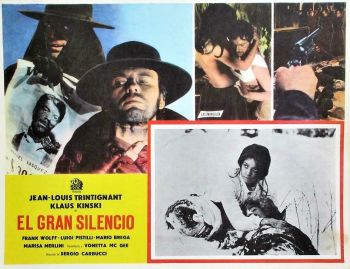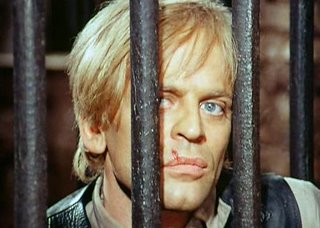The Great Silence Review by J.D.
Review of The Great Silence (1968) aka Il grande silenzio / The Big Silence;
“Wherever he goes, the silence of death follows…”
As many of you probably know, oddly enough the upper echelon of Eurowestern films are all by three directors with the first name of Sergio, as in Leone, Corbucci, and Sollima. Now a look at what I consider the best film by Corbucci, his 1968 film The Great Silence. Corbucci, you might remember, directed one of the first and most famous spag westerns, Django. The Great Silence is a much better film, and it’s one of the few that you’ll read about (aside from Sergio Leone’s films) that transcends the B-movieishness that pervades much of this genre. I've got mixed feelings about Corbucci's westerns; some of them are indeed masterpices, others get a little too campy for me (such as The Mercenary, and parts of Companeros). This one, however, is a classic.
It stars French actor Jean-Louis Trintignant as "Silence", the typical ‘mysterious stranger in town’ that is the archetype of the genre, with a twist… he’s mute, as he had his throat cut when he was a boy, by some bounty hunters after his father. As expected, he’s a fast draw that never draws first, and he has a penchant for shooting the fingers off of people and letting them live. German actor and Spag Western regular baddie Klaus Kinski stars as Loco, a particularly nasty bounty hunter. Genre regulars Fred Wolff, Mario Brega and Luigi Pistilli also have roles. And, most interestingly enough, there’s a spaghetti-western/blaxploitation flick connection: the heroine named Pauline is played by the sexy Vonetta McGee, who has been in such blaxploitation notables as Detroit 9000, Blacula, Hammer, and Shaft in Africa.
It takes place in a small turn-of-the-century town in Utah, where some Mormons, forced out of town, had taken to robbing to survive and a bounty is put upon their heads, which Loco is more than happy to collect. After he kills Pauline’s husband, she hires Silence to kill Loco. Silence takes out a lot of Loco’s men in the saloon, and is shot in the process, going into hiding with Pauline. American actor Fred Wolff stars as a rather funny and clumsy sheriff who is tired of all of the bounty hunters’ killings. At the end, as the sheriff tries to bring Loco to justice, the Mormons are led into town where they are deceived by the bounty hunters into thinking there will be food and provisions for them. This leads to a big showdown at the end with Silence, Loco, and the hostages. And let’s just say it has a rather shocking, powerful ending that will leave you rather stunned.
I liked this one… minimal, if any, cheese factor. The video restoration looked good, but unfortunately the Region 1 release I had only has the English soundtrack. I usually prefer to watch these in the original Italian with subtitles, because sometimes the English is strange and cheesy. It was ok, this time. Another great thing about the film was the location; it was filmed in the high peaks of the Pyrenees, so the scenery is pretty breathtaking. Just about every scene is covered in snow, a marked contrast from the rest of the genre, usually filmed in the deserts of Almeria, Spain. The acting was great, Kinski in particular, playing his Loco with frightening amorality, unlike the over-the-top acting of, say, Tomas Milian, another spag baddie regular. Ennio Morricone’s soundtrack is both haunting and appropriate.
It is a very cynical, pessimistic film. Others have seen the political overtones regarding the futility of the individual being able to make things right. I didn’t really catch the politics of it, it wasn’t so direct as in Damiano Damiani’s excellent A Bullet for the General. Nevertheless, this was a great flick, and I can recommend it with no reservations. It's in many fans' top 20 lists for good reason.
You can read Len's review of The Great Silence here.
This article is part of the A Fistful of Pasta archive





